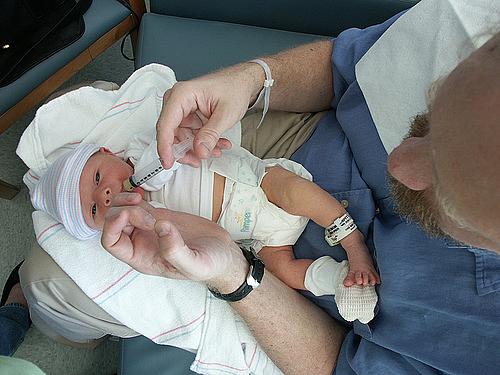Infant formula study evokes range of reactions

Some headlines earlier this week made it sound like one of the reigning orthodoxies of breast-feeding was crumbling. Mothers have been hitherto told they should avoid giving their newborns formula in the days after birth because it will make it harder to get babies breast-feeding later. But now a new study has destroyed that consensus. Or has it? The actual study turns out to be quite a bit more narrow and nuanced than the headlines let on.
The research in question, a randomized controlled trial published in the journal Pediatrics, found that among newborns at risk for developing breast-feeding problems, those whose diets were supplemented with small amounts of formula until a mother’s milk came in were much more likely to be exclusively breast-feeding three months later compared to those who were exclusively breast-fed from the start.
Most likely because the results appear to challenge the existing consensus (the American Society of Pediatrics recommends babies be exclusively breast-fed for the first six months), the study quickly generated a flurry of reports and blog posts from the major news outlets.
So how did reporters interpret the study? What kind of context and caveats did they offer readers? Let’s take a look.
The Los Angeles Times’ Eryn Brown begins by summarizing existing orthodoxy –mothers should avoid formula right after birth – before delving into the specifics of the study and its methodology. She helpfully emphasizes some key nuances:
The keys to this success, the team suggested, may have been the strict limitations placed on the formula feeding: The infants were not given enough to satisfy their appetite for breast milk, using a syringe made sure they didn't learn to prefer bottles to the breast, and having a clear time to end formula use (i.e., when milk came in) made sure mothers didn't slide into offering formula on an ongoing basis.
Brown also quotes from the skeptical commentary published alongside the original study:
In a commentary also published Monday in Pediatrics, Case Western Reserve pediatrician Dr. Lydia Furman questioned the team's methods – and implied unintended bias, noting that one coauthor has "financial ties to the formula industry."
“There are critical limitations to study design that bring their conclusion into question and restrict the generalizability of their results,” she wrote.
By “critical limitations” does she mean the study’s small sample size? Other factors? Brown doesn’t tell us.
While the journal Pediatrics made it easy on reporters by including a skeptical voice raising issues of conflict of interest and methodological limitations alongside the original study, not all accounts included their mention.
The New York Times’s Well blog, which devoted six short paragraphs to the study, kicks off with the following breezy lead:
Good news for new mothers: A study suggests that carefully regulated formula feeding before your milk comes in will not harm your baby’s ability to breast-feed, and done properly, it may even help in the long run.
It’s not until the last paragraph that readers are given the following important caveat from one of the study’s authors, which would seem to circumscribe the “Good news for new mothers” opening gambit quite a bit:
“Most babies don’t need formula,” said the lead author, Dr. Valerie J. Flaherman, a pediatrician at the University of California, San Francisco, Benioff Children’s Hospital. “But some kids are at risk for weight loss, and this could be an option.”
Weight loss is an important variable here: The study was conducted on 40 newborn infants who had lost 5 percent of their birth weight by the time they were 36 hours. The babies were randomly assigned to two groups. One group got small amounts of formula via syringe after breast-feeding (this was stopped when the mother’s “mature milk production” began), while the others were exclusively breast-fed. The study reports that at three months, 15 of 19 infants who got the formula during birth hospitalization were breast-feeding exclusively, while 8 of the 19 control infants were doing the same.
Bonnie Rochman’s coverage on Time’s Family Matters blog includes some withering criticism of the study from a breast-feeding proponent:
“This study goes against everything that’s been published for several years now from very reliable clinicians and researchers about the potential hazards of supplementing exclusively breast-feeding babies with formula,” says Dr. Kathleen Marinelli, an associate professor of pediatrics at the University of Connecticut School of Medicine and the chair-elect of the U.S. Breastfeeding Committee. “They’re flying in the face of years of research here and doing so rather glibly, stating that this is the new way to look at things.”
Rochman immediately undercuts that level of rhetoric, however, by circling back to Dr. Flaherman’s insistence on a more modest program:
“This isn’t something we think all people should do,” she says. “It is just a potential tool for moms to consider using if they think it might be helpful.”
Perhaps the soundest response to Monday’s study came from Dr. James Taylor via Michelle Castillo’s story for CBS News:
“The results of this study are provocative and challenge conventional wisdom,” said Dr. James Taylor, medical director for the University of Washington Medical Center's Newborn Nursery who did not participate in the study, said in a press release. "It is crucial that we have more randomized controlled trials on interventions to increase breast-feeding rather than relying on heavily confounded observational studies or biased expert opinion.”
So, we need more good studies. The larger truth is often less sexy than the headlines.
Image by crimfants via Flickr

